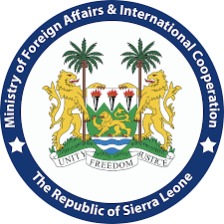Foreign policy is the cornerstone of a nation’s engagement with the international community. It shapes a country’s interactions with other nations, influences global perceptions, and ultimately serves the interests of its citizens. In the case of Sierra Leone, a nation that has weathered numerous challenges since gaining independence in 1961, the need for a more coherent and strategic foreign policy stance has become increasingly evident.
Foreign policy encompasses the process of managing a nation’s relationships with sovereign states and international actors. It is a dynamic and multifaceted arena where governments seek to safeguard their interests, promote economic growth, and ensure security through diplomacy, negotiation, and collaboration. For Sierra Leone, a country grappling with complex domestic challenges, an effective foreign policy is not just a luxury but a necessity.
Over the years, Sierra Leone has been an active participant in international diplomacy. Its role has evolved from addressing Cold War dynamics to confronting contemporary challenges such as international terrorism, drug trafficking, migration, money laundering, and climate change. These global issues demand cooperation and collaboration among nations, making foreign relations a critical tool for addressing shared challenges.
Sierra Leone’s foreign policy cannot be isolated from its domestic priorities. As one of the world’s least developed countries, the nation faces pressing issues related to education, healthcare, infrastructure, and basic services. To surmount these challenges, Sierra Leone requires assistance, support, and cooperation from more developed countries and international institutions.
Sierra Leone’s foreign policy should be an extension of its domestic agenda and development goals. While remaining committed to global agendas, it should prioritize international relationships and partnerships that directly contribute to the country’s growth. This approach is particularly relevant as Sierra Leone seeks to strengthen economic ties with African nations, capitalizing on initiatives like the African Continental Free Trade Area and regional integration within ECOWAS.

The world is rapidly changing due to technological advancements such as Artificial Intelligence, 3D printing, and the transformative impact of the internet. Sierra Leone must leverage these opportunities through effective diplomacy and foreign relations. This includes promoting trade, investment, and technology transfer to enhance its developmental efforts.
Sierra Leone’s foreign policy has historically followed a pragmatic non-alignment approach. However, to meet the evolving challenges of the 21st century, it is essential to have a more focused and coherent foreign policy, while guided by pragmatic non-alignment, has faced challenges and controversies, as evidenced by recent decisions regarding the embassy in Israel. Such instances can lead to confusion and inconsistency in the nation’s foreign relations.
To address these challenges and provide clear guidance, Sierra Leone should develop a comprehensive and single-source foreign policy document. Such a document would serve as a reference point for heads of diplomatic missions, career foreign service officers, and other envoys of the State. This policy framework can help achieve several crucial objectives. First there must be policy coherence. A single-source document would promote coherence in Sierra Leone’s foreign relations. It would provide clear instructions, principles, and guidelines for diplomats, ensuring that the nation’s positions and actions align with its strategic interests.
Second, by detailing historical foundations, critical elements, and recent developments of international partnerships, this document can help mitigate the risk of jeopardizing strategic partnerships due to a lack of information or misunderstandings. Third, Sierra Leone’s foreign policy should emphasize economic diplomacy, with a focus on trade, investment promotion, and technology transfer. This approach can help drive economic growth and development. We should emphasize the importance of building the capacity of Sierra Leone’s foreign service to engage effectively in economic diplomacy at bilateral, multilateral, and non-state levels.

Fourth, we should prioritize the protection of Sierra Leone’s sovereignty, territorial integrity, and national stability. Additionally, it should promote international cooperation for peace, security, and mutual respect among nations while respecting international law and treaty obligations.
In addition, our foreign policy should guide efforts to maintain a favorable international image of Sierra Leone, attracting investors, donors, and tourists to support its development goals. It should include measures to protect and assist its citizens living abroad, including students, businessmen, and aid workers and should enable Sierra Leone to conduct its relations with foreign states, international organizations, and non-state actors in ways that expand its influence in sub-regional, regional, and global affairs.
The development and implementation of a coherent and strategic foreign policy are essential for Sierra Leone to navigate the complex challenges of the modern world effectively. This policy should be grounded in the nation’s economic development goals, promote international cooperation, and provide clear guidance to its diplomats. With a well-defined foreign policy, Sierra Leone can position itself as a reliable partner for global peace, security, and development, harnessing the opportunities of the 21st century while addressing its pressing domestic needs. Sierra Leone’s journey toward a clearer and more coherent foreign policy is a vital step in achieving its national interests and development goals on the international stage.
